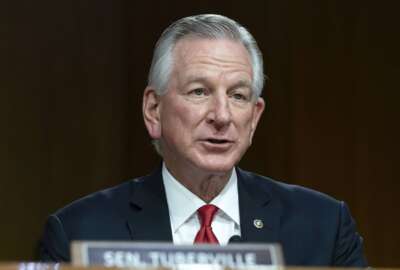Leaders continue calls to end military holds
The Army and Air Force secretaries warn about how Sen. Tommy Tuberville’s (R-Ala.) holds on confirming officers are hurting the military and service members�...
Several leaders across the military and in Congress urge the Senate to end the almost year-long military holds, which are hurting the military’s readiness, its service members and their families.
Senator Tommy Tuberville (R-Ala.) has blocked military nominations because of his opposition to the Department of Defense’s policy that offers paid leave and travel reimbursement to military personnel seeking abortions. Tuberville has held up nominations for months.
Secretary of the Army Christine Wormuth said the holds have “been very problematic.” Specifically, some people are performing two roles, while others are retiring because they are tired of waiting.
“In the short term, we’ve had effects that everyone’s talked about,” Wormuth said at the Politico Defense Summit last week. “My director of the Army Staff is dual-hatted right now as the Vice Chief of Staff of the Army. We have multiple instances of that at Army commands all around the country. I have a two-star general, who was awaiting confirmation, who has submitted his retirement papers, and has just kind of said, ‘I don’t have certainty and at this point, what’s best for my family is to just go ahead and pull my papers.’ And I would expect that if we don’t see the Senate resolve this hold by Christmas, there will be more of those.”
“These officers and their families have been waiting for months to have some certainty and to go do the jobs that they have trained and worked hard for for decades,” Wormuth said “And in the long term, I really have deep concerns about what my majors, lieutenant colonels and colonels are thinking about this. They already see the increasing partisanship in our nation … and now we have a situation where the toothpaste is out of the tube and general officers and flag officers can have their nominations put on hold.”
Wormuth said this sentiment could lead to more officers leaving.
Secretary of the Air Force Frank Kendall said the holds are also negatively impacting his service.
“It’s incredibly debilitating,” Kendall said.
He compared it to football, saying, “You want to put your best team and you want your players in the places where they’re going to do the most good for you. And we need a winning team.”
Kendall said that the holds are bad for strategy and the organization and temporary leaders cannot do anything major since they will not have the job for a long time.
“We’re up against the most compelling and difficult strategic threat that I’ve ever seen,” Kendall said. “So, we need our best people in the places where they can do the most good for the organization. Not having those transitions occur means that we basically are marching in position, while we wait for new leaders to come into those jobs. It’s very hard for a temporary leader who knows he or she is only there for a limited period of time to make any major initiatives. So, that slows us down.”
Sen. Jack Reed (D-R.I.), the chairman of the Senate Armed Services Committee, said that the holds “must end and we’re moving to end it.”
Last week, a Senate panel took a big step to help end Sen. Tuberville’s hold on nearly 370 military nominations. The Senate Committee on Rules and Administration voted 9-7 to let Senators confirm large groups of nominees with a single vote. That basic idea is the Senate’s custom — but until now, it has required unanimous consent, and a single senator can object and stop the process. The new resolution would change that, but implementing the new approach would need a floor vote by at least 60 Senators. Democrats said at least nine Republicans will need to vote in favor of it.
“To get legislation through, in most cases, you need 60 votes,” Reed said. “If we had 65 Democrats, yeah, this would not have happened, it would have been done very quickly, but we have to get Republican support, or we have to convince Senator Tuberville to give up the holds. My Republican colleagues have been working hard to try to convince him[, but] that has no effect so far. So now we’re using a resolution not to change the rules, but to suspend them.”
Reed applauded Senators Joni Ernst (R-Iowa), Dan Sullivan (R-Alaska) and Todd Young (R-Ind.) — who are all military veterans — and others for urging the Senate to drop the holds and confirm the officers.
“Senator Tuberville’s actions have been extremely harmful to the military,” Reed said. “These men and women are promoted on merit; they should not be seen as political tokens that can be used in policy debates. It has impacted readiness.”
While the Senate is working to block the hold with its resolution, it has tried to confirm some military leaders. In early November, the Senate confirmed three nominations, but it still has more than 370 nominations to go. David Allvin is now the chief of staff of the Air Force and Lt. Gen. Chris Mahoney is the assistant commandant of the Marine Corps. Admiral Lisa Franchetti was confirmed as the chief of naval operations and will be the first woman to serve in that role, as well as being the first woman on the Joint Chiefs of Staff. Defense Secretary Lloyd Austin said the unprecedented delay to confirm these leaders has hurt military readiness.
Kendall said the holds are hurtful to those who have served. He echoed what Wormuth said, noting that the Air Force has also had people leave as a result of the holds.
“It’s not fair to the people involved who served their country honorably for decades,” Kendall said. “Somebody pointed out to me that the people we’re doing this to are the people who volunteered to come serve after 9/11 and now they’re at the peak of their career. They’ve had long, successful careers and they’re not being treated respectfully by this. We have had people leave. We have more than one case in which people have said, ‘I’ve had enough, I’m not going to sit here and put up with this, I’m going to leave, go ahead and retire,’ which all of these people generally are eligible to do.”
Wormuth said there could be more officers leaving because they are tired of and frustrated by the hold. “I’m not saying a tsunami, but I think you will see more officers put in their retirement papers if this isn’t resolved by the end of the year,” she said.
The hold not only affects those nominated, but it also affects their families, for example with moves or schools.
“We have families now that have moved 10 times and they’re getting ready to move and they can’t – they’re sitting,” Reed said. “Children can’t go to the schools they planned to go, and it’s really deleterious to the family.”
Kendall shared how this is impacting military spouses who are, for example, doctors and nurses, that would need to get licensed in another state to practice there, but they cannot begin that process without the certainty that they will be moving to another location.
Kendall also told a story of someone located on the East Coast being assigned a new position on the West Coast. Their son was going to go to college in the new location that the family was expected to move. The son intended to live at home. However, because of the holds, the family has not moved.
“Now that son is living in an apartment they had to rent for $18,000,” Kendall said. “That’s a big hit to someone who’s not expecting that kind of expense all of a sudden.”
Reed said that this also sends a message to others in the military, who may not want this to happen to them.
“It’s sending a signal also to the colonels and the lieutenant colonels in the services, the commanders, the lieutenant commanders,” Reed said. “Do I want to get to the point of being a general officer and then be held as a hostage for a policy I don’t have any influence on?”
However, the holds have been going on for so long that it’s starting to affect the next nomination cycle.
“We’re now so long into this that we’re starting to impact the next year,” Kendall said. “We do yearly cycles of this and we have now held up an entire year’s cycle for almost a year, like nine months now. The first person who was stopped in the Air Force by Senator Tuberville was February last year.”
Copyright © 2024 Federal News Network. All rights reserved. This website is not intended for users located within the European Economic Area.
Kirsten Errick covers the Defense Department for Federal News Network. She previously reported on federal technology for Nextgov on topics ranging from space to the federal tech workforce. She has a Master’s in Journalism from Georgetown University and a B.A. in Communication from Villanova University.
Follow @kerrickWFED







